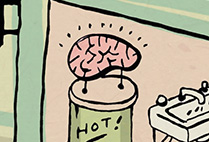Over the course of what colleagues describe as a legendary career, Michael Z. Fleming taught a wide range of courses—from personality theory, abnormal psychology, and counseling to forensic psychology and ethics in psychology. Fleming (CAS’66, GRS’71), whose career at Boston University spanned four decades, died on January 7, 2013, after a long illness.
During his tenure at BU, the College of Arts & Sciences lecturer coordinated Metropolitan College’s evening school program in psychology for nearly three decades and was a School of Medicine adjunct associate professor of psychiatry.
“Michael Fleming was a talented and dedicated educator,” says Michael Lyons, a CAS professor of psychology and department chair. “He was a very charismatic figure in the classroom. Many of my advisees had to wait years to get a seat in his legendary psychopathology class.”
In addition to being a brilliant teacher, Fleming was also a clinical practitioner, working in many clinical areas over the years. Early on, he saw private patients who were seeking gender reassignment. This clinical experience led him to publish work on gender dysphoria, specifically female-to-male transsexuals. He had a long-term research interest in the use of feature films to teach psychology and later became interested in the use of film as a part of psychological assessments.
More recently he served as a forensic psychologist and an inpatient dual diagnosis (addiction and mental illness) coordinator for the Massachusetts Department of Mental Health.
In his role as a forensic psychologist, Fleming conducted court-ordered evaluations, including competency to stand trial, criminal responsibility, and aid-in-sentencing. He also provided court testimony regarding commitment of forensic patients, those found not guilty by reason of mental illness, found unfit for trial, or given a limiting term. He was a liaison with the court regarding such patients, conducting risk assessments and consulting with treatment teams on violence risk and sexual offending risk issues.
As an inpatient dual diagnosis coordinator, he evaluated and provided clinical services to patients with both substance abuse and major mental illness. He had extensive experience in crisis management and treatment interventions with patients experiencing post-traumatic stress disorder. He worked with both inpatients and outpatients with a variety of addictions, using group and individual treatment. He particularly loved working with his humor and film groups.
Colleagues recall Fleming’s gift for developing meaningful interactions with nearly everyone he met. “If there was a way to get you to smile or to make a human connection, he was determined to find it—not in a superficial fashion, but rather by using his talents as a psychologist to understand your world,” says Daryl Costos, a CAS lecturer in psychology.
“We have lost a beloved colleague and an extraordinary teacher,” says Lyons.













































Related Stories
School of Medicine Professor Named CDC Advisor
Kermit Anthony Crawford to serve on Board of Scientific Counselors
BU Psychiatry Researcher Wins Fulbright
Jennifer Gottlieb will bring new approach in managing PTSD and serious mental illness to Spain
Patient-Centered Team Treatment of Schizophrenia Works Best
SAR prof senior author on landmark study
Post Your Comment